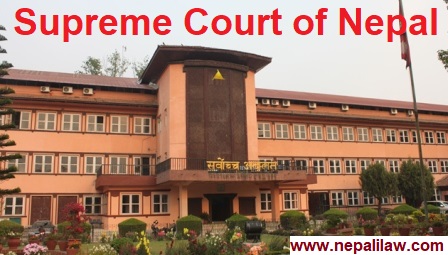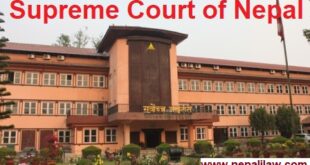18 May, Kathmandu.
The Supreme Court of Nepal has issued a mandamus order in the name of the government to formulate a legislation related to the federal civil service within 9 months by providing a reservation policy for all classes and groups recognized by the constitution of Nepal.
An order has been issued to make the necessary arrangements including the creation of legal arrangements including the Federal Civil Service Act and other laws, rules, and regulations, in order to provide reservations to all classes and groups, including those identified by the constitution.
In the full text of the verdict on the writ filed by the Tharu Kalyankarini Sabha and advocate Shravan Kumar Choudhary for not giving reservation to the Tharu community in the recruitment advertisements of government employees and institutions, the Supreme Court has ordered to enact laws within 9 months.
In addition, for other new reserved categories that are not covered at present, arrangements should be made to compensate for the losses incurred due to non-reservation in the financial year 2021/22, including those who have actually disappeared, including the Public Service Commission, State Public Service Commission, Teachers Service Commission, various banks, authorities, funds, the Board has issued orders for permission in the name of government companies, corporations, universities, institutions, Nepali Army, Nepal Police, Armed Police Force.
The joint bench of the Supreme Court comprising Justices Bishwambhar Prasad Shrestha and Dr. Anand Mohan Bhattarai decided on 24th Magh 2079 (7th February 2023). Recently, in the full text of the decision, the Constitution has given a mandate to the Prime Minister and the Council of Ministers to give reservations to all classes and groups covered by the right of social justice.
In Article 42 of the Constitution of Nepal, economically, socially, or educationally backward women, Dalits, tribal tribes, Madheshi, Tharu, Muslims, backward classes, minorities, marginalized, disabled persons, gender and sexual minorities, farmers, workers, citizens of oppressed or backward areas, It is mentioned that economically disadvantaged Khas Aryas have the right to participate in state bodies based on the principle of proportional inclusion. Some of these communities, including the Tharu, did not get a reservation in government advertisements until now.
Since the implementation of the reservation system should be done through the law, the Federal Civil Act, and other laws, rules, and regulations, including the creation of service-related legal arrangements, including all necessary arrangements, are issued within 9 months from the receipt of this order. has been done’ said in the verdict.
Dissatisfaction has been expressed in the judgment saying that the constitution has mentioned that the provisions on positive discrimination will be implemented within 3 years, but the law has not been enacted so far. The Supreme Court recalled one of its own judgments on a reservation and said, ‘…even after all these years of this court’s directive to create a law on the matter, it has not been found that the provision has not been made so far, so it does not seem to be acceptable to wait too long to confuse this issue under the provisions of the Constitution.’
It is also mentioned in the judgment that even if the constitution stipulates that the law should be made within three years for the implementation of the system guaranteed as a fundamental right, it is not acceptable to delay it citing executive or legislative wisdom or any other reason.
In the judgment, not only the Tharu community but also other communities are coming to the Supreme Court with a case, it has been ordered to address all the communities at once through the law.
At present, the Public Service Commission and public organizations allocate 45 percent of seats for reservation while filling the posts of employees. The Supreme Court made the 45% allocated for a reservation to 100%, and in that system, it is said that reservation should be given to all the classes and groups identified by the constitution after deciding by the legislature as to what percentage rate should be done for the socially, culturally and economically backward classes and groups identified by the current constitution.
While arranging reservations, it has been asked to make a legal arrangement so as to reach the categories and individuals for which reservation is necessary. “…based on the certain standards, it is necessary for the class and the person to reach what is necessary and there should be realistic arrangements and arrangements that can be made except for the people of the upper level who have made personal and family progress despite being in the reserved category and do not need the facility of reservation,” the judgment said. It is mentioned in the judgment that only if that is done, equal access to rights and equality in consumption will be maintained and the goal of the constitution to build an egalitarian society will be meaningful.
 Nepali Law A complete legal information portal
Nepali Law A complete legal information portal



